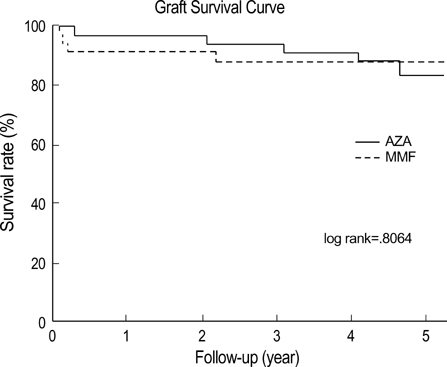J Korean Med Sci.
2005 Feb;20(1):79-81. 10.3346/jkms.2005.20.1.79.
The Influence of Mycophenolate Mofetil and Azathioprine on the Same Cadaveric Donor Renal Transplantation
- Affiliations
-
- 1Department of Surgery, Samsung Medical Center, Sungkyunkwan University School of Medicine, Seoul, Korea. kmhyj111@hotmail.com
- KMID: 1781730
- DOI: http://doi.org/10.3346/jkms.2005.20.1.79
Abstract
- In order to evaluate whether immunosuppressive agents such as mycophenolate mofetil (MMF) and azathioprine would differently influence the outcome of the renal transplants, we prospectively analyzed the incidence of acute rejection episodes, cytomegalovirus infection within the first 6 months following renal transplantation and 5 yr graft survival rate after minimizing influences of donor factors by grafting the same cadaveric donor kidney. There was no significant difference in sex, HLA mismatch, cold ischemic time, and patients' weight between the two groups. Contrary to the previous studies which demonstrated that MMF could lower the incidence of acute rejection episodes and improved graft survival rate, the two groups showed no significant difference in the incidence of acute rejection episodes and 5-yr graft survival rate as well. This discrepancy in these results might explain that donor factors could be important to cadaveric renal transplantation. Thus, we suggest that the influences of donor factors should be considered in further clinical studies of cadaveric renal transplantation.
MeSH Terms
-
ABO Blood-Group System
Adult
Azathioprine/*pharmacology
Body Weight
Cadaver
Cytomegalovirus/metabolism
Cytomegalovirus Infections/metabolism
Female
Graft Rejection
Graft Survival
Histocompatibility Testing
Humans
Immunophenotyping
Immunosuppressive Agents/pharmacology
Ischemia
Kidney Diseases/mortality/therapy
Kidney Transplantation/*methods
Male
Middle Aged
Mycophenolic Acid/*analogs & derivatives/*pharmacology
Prospective Studies
Time Factors
Tissue Donors
Treatment Outcome
Figure
Reference
-
1. Halloran P, Mathew T, Tomlanovich S, Groth C, Hooftman L, Barker C. Mycophenolate mofetil in renal allograft recipients: a pooled efficacy analysis of three randomized, double-blind, clinical studies in prevention of rejection. Transplantation. 1997. 63:39–47.2. Humar A, Hassoun A, Kandaswamy R, Payne WD, Sutherland DE, Matas AJ. Immunologic factor: The major risk for decreased long-term renal allograft survival. Transplantation. 1999. 68:1842–1846.3. Tricontinental Mycophenolate Mofetil Renal Transplant Study Group. A blinded, randomized clinical trial of mycophenolate mofetil for the prevention of acute rejection in cadaveric renal transplantation. Transplantation. 1996. 61:1029–1036.4. Sollinger HW. U.S. Renal Transplant Mycophenolate Mofetil Study Group. Mycophenolate mofetil for the prevention of acute rejection in primary cadaveric renal allograft recipients. Transplantation. 1995. 60:225–232.
Article5. European Mycophenolate Mofetil Cooperative Study Group. Placebo-controlled study of mycophenolate mofetil combined with cyclosporin and corticosteroids for prevention of acute rejection. Lancet. 1995. 345:1321–1325.6. Pfaff WW, Howard RJ, Patton PR, Adams VR, Rosen CB, Reed AI. Delayed graft function after renal transplantation. Transplantation. 1998. 65:219–223.7. Deepika S, Timothy W, Meyer M. Influence of donor factors on early function of graft kidneys. J Am Soc Nephrol. 1999. 10:1317–1323.8. Vanrenterghen Y. The use of mycophenolate mofetil in renal transplantation. Nephron. 1997. 76:392–340.9. Lufft V, Kliem V, Tusch G, Dennenberg B, Brunkhorst R. Renal transplantation in older adults: is graft survival affected by age? A case control study. Transplantation. 2000. 69:790–794.10. Lufft V, Tusch G, Offner G, Brunkhorst R. Kidney transplantation in children: impact of young recipient age on graft survival. Nephrol Dial Transplant. 2003. 18:2141–2146.
Article
- Full Text Links
- Actions
-
Cited
- CITED
-
- Close
- Share
- Similar articles
-
- Pretransplant mycophenolate mofetil reduces intrahepatic cholangiopathy related to laparoscopic donor hepatectomy in ABO-incompatible liver transplantation
- Mycophenolate Mofetil Versus Azathioprine in Cyclosporine Based Triple Immunosuppression
- The Influence of Mycophenolate(MMF) and Azathioprine(AZA) in the Same Cadaveric Renal Transplantation
- The Effectiveness of Mycophenolate Mofetil(MMF) in the Prevention of Acute Rejection and Graft Outcome in Clinical Renal Transplantation
- Phased Reduction of Cyclosporine Combined with Mycophenolate Mofetil in Renal Transplant Recipients: Three-year Results of a Prospective Study


